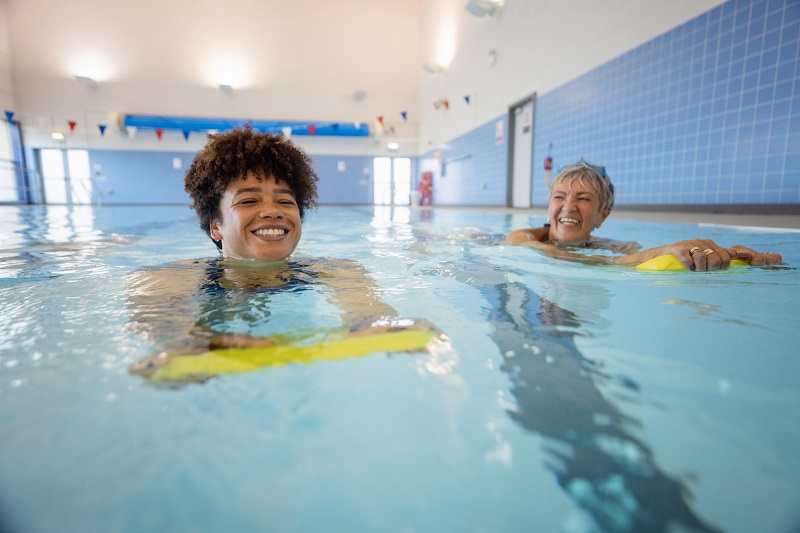Is Swimming Good Exercise? 7 Health Benefits of Swimming
When you’re a kid, splashing around in a pool, ocean or lake is one of the most fun ways to spend a summer day. For adults, swimming helps tone up your body, burn calories and lose weight. Plus, it’s still a lot of fun! Swimming regularly has a variety of other health benefits that can help you feel better and maybe even live longer. It also helps you stay cool and keeps your daily activity fun and fresh. Here are seven health benefits of swimming and a few hints to help you include it in your workout routine.
1. Build Muscle

In contrast to walking, running and most other kinds of exercise, swimming uses all your major muscle groups, from your shoulders and arms to your abdominals to your legs and glutes. By gently working these muscles to pull you through the water, you’ll tone up and look sleeker all over.
2. Joint Protection
If you sometimes feel soreness in your hips and knees from walking or if you suffer from arthritis, you may want to include swimming or other pool exercises in your activity routine. Swimming is said to be good for joint health because it is low impact, helps you to access a fuller range of motion, and may even improve circulation. Just be sure to speak to your doctor to ensure swimming is safe for you.
3. Burning Calories and Fat

Swimming burns about 216 calories in 30 minutes (for a 155-pound person). That’s about 20 percent more than the same time walking (175 calories). You’re also gaining muscle, which causes your body to burn more calories even when you’re at rest. Middle-aged women who swam three times a week lost more body fat compared to those who walked three times a week, according to a study published in the Journal of Exercise Rehabilitation.
Check out these five fun ways to burn calories in the pool! >
4. Heart Health
Swimming strengthens your heart and lungs along with your more visible muscles. Another study looked at overweight men and found that after eight weeks of regular swimming at moderate intensity, their blood pressure improved and their risk of heart disease (measured by the stiffness of their arteries) was lower.
5. Stress Relief

Just being in the water can be relaxing and may allow your mind to shift its focus away from your cares and worries. Swimming may have even more direct benefits for mental health, according to a report published in Evidence-Based Complementary and Alternative Medicine. The data from the study suggests that swimming has antidepressant effects.
6. Live Longer
Many factors influence how low we live, but a study, published in the International Journal of Aquatic Research and Education, looked at the mortality rates of men who swam regularly versus those who walked or ran for exercise. They found some interesting results. After accounting for age, body mass index (BMI), smoking status, alcohol intake and family history of cardiovascular disease, swimmers had about a 50 percent lower all-cause mortality risk than the walkers and runners.
7. Good for Everyone

Like walking, swimming is a healthy activity for people all ages and fitness levels. If you’re new to regular exercise, swimming lets you go at your own pace and gradually work your way up to 30 minutes of moderate effort. Many people who have disabilities or limitations in their movement can get the benefits of exercise from movement in the water, which provides natural support and resistance to strengthen muscles. Speak to your doctor to make sure swimming is right for you before getting started.
How to Get Started With Swimming

Swimming is easy to try as an exercise even if you don’t have advanced skills. Many public pools offer basic swimming lessons for adults. If you’d like a more vigorous workout, watch one of the many YouTube videos showing the basics of all the common strokes. You can even exercise in a pool without swimming at all. Ready to jump in? Here are a few hints to help you.
- Kick start: When you’re new to swimming as a workout, a kickboard can be very helpful. It’s a rectangular piece of foam that you hold to keep your upper body afloat while the motion of your legs propels you through the water. This loosens up your hips and works your leg muscles while you get comfortable in the water.
- Breaststroke is best: There are four basic strokes used in swimming: freestyle (sometimes called the “crawl”), butterfly, back stroke and breaststroke. Butterfly is very challenging and is typically only for well-conditioned swimmers. Freestyle gives you a good workout, but you need to practice breathing to the side as you swim to do it steadily. Breaststroke is simple and intuitive, and it works your whole body but won’t strain you. It’s the best choice for beginners.
- Work your way up: Even if you’ve been walking regularly and have built up your endurance, swimming can be more demanding than you expect. Start by swimming one lap—up and back—and gradually increase the distance and time as you get stronger.
- Pool as gym: You don’t have to swim at all to reap the benefits of working out in the water. Walk back and forth in the pool and you’ll notice it’s more challenging than walking on the land because there’s more resistance to every movement. That helps to build your muscles and cardiovascular strength but is gentle on your joints. Water aerobics classes are another fun and cool way to work out in the pool this summer. However you choose to exercise in the water, you are sure to drop extra pounds and feel more fit. That’s a big win for you!
Looking for more ways to lose weight this summer? Try these summer activities that torch calories! > And be sure to check out Nutrisystem for a convenient meal delivery service that sends you easy, breezy meals perfect for the season. Get started today! >
The post Is Swimming Good Exercise? 7 Health Benefits of Swimming appeared first on The Leaf.
source https://leaf.nutrisystem.com/health-benefits-of-swimming/


Comments
Post a Comment